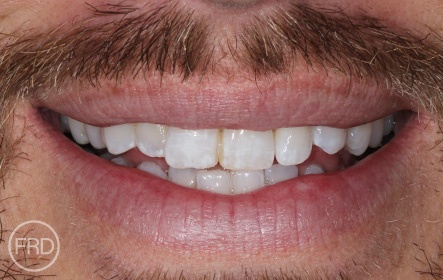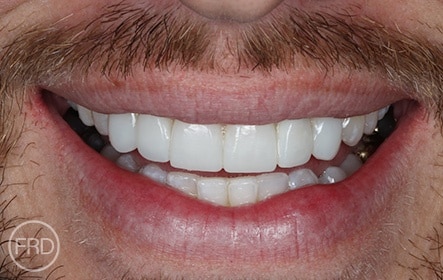Enquire about Composite Bonding

What is composite bonding?
Composite bonding is a dental technique used to modify the shape, size, or appearance of teeth. It is commonly performed in cosmetic dentistry to address aesthetic concerns such as irregularities, minor gaps, or surface imperfections. Dentists apply it to teeth that may appear uneven, slightly misaligned, or worn. This technique is often chosen to enhance overall smile symmetry or create a more uniform look.
Composite bonding is frequently used on front teeth, as these are the most visible teeth in the mouth. While it is not a structural dental treatment, it serves an important role in cosmetic improvements. The results aim to match the natural characteristics of teeth, including colour and contour, creating a balanced and visually appealing smile when applied correctly.
Improve your smile in one sitting
Composite bonding is a non-invasive way to enhance your smile. This cosmetic treatment can repair minor imperfections such as chipped teeth, small gaps, and uneven edges in just one appointment. Unlike other dental procedures that require multiple visits, composite bonding delivers instant results, you can walk out with a more confident smile in just a few hours. In some cases, teeth whitening may be recommended beforehand to ensure a seamless colour match, and a follow-up re-polish appointment may be needed for optimal results.
Beyond speed, composite bonding offers several other benefits. It is a painless procedure that requires little to no enamel removal, preserving the natural structure of your teeth. The resin material is carefully matched to your tooth colour, creating a natural-looking finish. Additionally, it is a cost-effective alternative to veneers or crowns, making it an accessible option for many. With proper care, your bonded teeth can stay looking great for years, helping you maintain a confident and radiant smile.
Who composite bonding is suitable for
Composite bonding is a great option for people who want to improve their smile quickly and easily. It is a non-invasive treatment that can fix minor cosmetic issues without the need for complex dental work. Here’s who it is most suitable for:
People who do not have severe dental problems
If your teeth are generally healthy but have small chips, minor gaps, or slight unevenness, composite bonding can help enhance their appearance without major treatment.
People who want a cosmetic treatment without removing too much tooth enamel
Unlike veneers or crowns, bonding does not require removing much enamel, making it a great choice for those who want a less evasive solution.
People preparing for a special event
If you have a wedding, graduation, or important event coming up, composite bonding offers a quick way to achieve a flawless smile in just one visit.
The composite bonding process
Composite bonding is a simple and painless procedure that can usually be completed in a single visit. The process begins with a consultation, where the dentist examines your teeth and discusses the results you want to achieve. Once a treatment plan is in place, the dentist selects a resin shade that matches your natural tooth colour for a seamless finish.
Before applying the bonding material, the tooth surface is gently prepared to help the resin adhere properly. The dentist then applies the soft, tooth-coloured resin and carefully shapes it to blend naturally with the surrounding teeth. A special curing light is used to harden the material, ensuring it stays in place.
Once the resin is set, the dentist polishes and smooths the bonded area to match the texture and shine of your natural teeth. The entire procedure is quick, comfortable, and requires no downtime, allowing you to enjoy your new smile immediately.
Composite bonding from Fulham Road Dental
At Fulham Road Dental, we offer composite bonding services designed to enhance your smile with a quick, non-invasive solution. Whether you’re looking to fix chips, gaps, or discolouration, our team tailors the treatment to meet your unique needs. We use tooth-coloured resin to seamlessly blend with your natural teeth, providing a flawless, natural finish.
The procedure is usually completed in just one visit, with no need for drilling or anaesthesia. Our experienced team ensures the highest quality care while prioritising your comfort. At Fulham Road Dental, we are committed to giving you a confident, radiant smile in a relaxed and welcoming environment.

Before Composite Bonding

After Composite Bonding
Composite Bonding FAQs
How long does composite bonding last?
Composite bonding typically lasts between 3 to 7 years, depending on factors such as the location of the bonded teeth, your oral habits, and the quality of the initial application. Bonding on front teeth may show signs of wear or discolouration sooner due to everyday use, while bonding on back teeth may last longer.
Though composite bonding is durable, it’s not immune to damage from habits like biting hard objects or grinding teeth. Over time, the material may naturally stain or wear down. Regular check-ups with your dentist can help monitor the longevity of the bonding and address any potential issues early.
Is composite bonding painful?
Generally speaking, composite bonding is not painful. The procedure is minimally invasive and typically does not require anaesthesia. Unlike other treatments such as crowns or fillings, there is no need for drilling in most cases, making it a comfortable option for many patients. Your dentist will carefully apply a tooth-coloured resin to the affected area, which is then shaped to match the natural contours of your tooth.
Since the process is relatively simple and doesn’t involve any major alterations to the tooth structure, discomfort is uncommon. Some patients may experience mild sensitivity after the procedure, but this usually subsides within a short time. Overall, composite bonding is a gentle and straightforward treatment that aims to enhance your smile without causing pain.
How do I care for bonded teeth?
Caring for bonded teeth is simple and similar to maintaining your natural teeth. Brush your bonded teeth twice a day using a soft-bristled toothbrush and fluoride toothpaste. Floss daily to remove plaque and food particles between your teeth, taking care not to snap the floss against the bonding. Avoid biting hard objects like pens, ice, or fingernails, as this can cause the bonding to chip or crack.
Be mindful of foods and drinks such as coffee, tea, and red wine. Whilst delicious, they can discolour the bonding over time. It’s also important to visit your dentist regularly for check-ups to ensure your bonding is in good condition. With proper care, your bonded teeth can remain functional and aesthetically pleasing for many years.
Will composite bonding look natural?
Yes – composite bonding is designed to blend seamlessly with your natural teeth. The tooth-coloured resin used in the procedure is carefully selected to match the shade, shape, and texture of your existing teeth, ensuring a flawless, natural appearance. The dentist will skilfully apply and sculpt the material to fit the contours of your tooth, creating a smooth, aesthetically pleasing result.
Because composite bonding can be customised for each patient, it is highly effective at addressing imperfections like chips, gaps, or discolouration while maintaining a natural look. With proper care, the bonded teeth will remain looking beautiful and undetectable, helping you achieve a confident, radiant smile.
How much does composite bonding cost?
The cost of composite bonding can vary depending on factors like the number of teeth treated, the complexity of the procedure, and the dental practice’s location. While it is generally more affordable than other cosmetic treatments like veneers or crowns, prices may differ. It’s best to consult with your dentist for a personalised quote based on your specific needs and treatment plan.
At Fulham Road Dental, composite bonding costs £415 per tooth. We understand that not everyone will be comfortable to pay a large cost upfront, so offer dental financing with 0% interest payment plans. These enable you to spread the cost, but still get your composite bonding done as soon as possible.
Is composite bonding better than veneers?
Whether composite bonding or veneers are better depends on your needs and preferences. Composite bonding is typically cheaper, less invasive, and can often be completed in one visit. It’s ideal for fixing small issues like chips, gaps, or discolouration. However, composite bonding may not last as long as veneers and could need repairs or touch-ups over time.
Veneers are more durable, resistant to stains, and can provide a longer-lasting result, but they require more preparation, including removing a small amount of enamel. While veneers are the better option for long-term durability, composite bonding is a quicker, more affordable treatment. Your dentist can help you decide which option is right for your smile and budget.
Can composite bonding be done on sensitive teeth?
Yes, composite bonding can usually be done on sensitive teeth. The procedure is minimally invasive and typically doesn’t require much drilling or removal of healthy tooth structure, making it a suitable option for those with sensitivity. However, it’s important to let your dentist know if you experience tooth sensitivity, so they can assess your situation.
If sensitivity is caused by issues like gum recession, enamel wear, or tooth decay, your dentist may recommend addressing these concerns first before proceeding with bonding. While composite bonding is generally safe for sensitive teeth, your dentist will ensure that any underlying causes of sensitivity are managed to help prevent discomfort during or after the treatment. This way, you can achieve a beautiful smile without worrying about added sensitivity.
Can composite bonding be used for teeth with large fillings?
Composite bonding can be used on teeth with large fillings, but its effectiveness depends on the condition of the tooth and filling. If the filling is in good condition and there’s still enough healthy tooth structure left, bonding can be a suitable option to enhance the appearance of the tooth.
However, if the tooth has extensive damage or decay around the filling, your dentist may recommend alternative treatments, such as a crown or veneer, to provide more strength and protection. Composite bonding works well for improving the aesthetics of a tooth with a large filling, but it may not always be the best choice for restoring function or durability in heavily compromised teeth. Your dentist will advise the best treatment for your situation.
Are there any risks associated with composite bonding?
Composite bonding is generally a safe and effective procedure, but like any dental treatment, it does carry some risks. One risk is that the bonding material may chip, crack, or wear down over time, particularly if you have habits like biting hard objects, chewing on pens, or grinding your teeth at night. Additionally, the bonding material can stain, especially if you regularly consume staining foods and drinks such as coffee, tea, or red wine.
Some people may also experience mild tooth sensitivity following treatment, though this usually fades within a few days. In rare cases, an allergic reaction to the materials used in composite bonding may occur. These risks are minimal and can often be managed with proper care, regular dental check-ups, and good oral hygiene. Your dentist will discuss any concerns before proceeding.